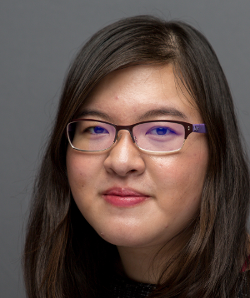Organizers

Jaisie Sin is a graduate student at the Technologies for Ageing Gracefully Lab and the Faculty of Information at the University of Toronto. Her research focuses on the inclusive design of conversational interfaces for underrepresented users, with a primary focus on ageing. She is a Full Papers Co-Chair at the upcoming CUI 2023 conference. She has also been a co-organizer of the CUI conference series and related workshops at CHI '19–'22, IUI '20–'21, and CSCW '20.

Heloisa Candello is a research scientist in the Responsible and inclusive technologies group of IBM Research laboratory in Brazil. Her work focuses on human and social aspects of Artificial Intelligence systems, particularly conversational user interfaces. Her work in this area includes the development and application of mixed-methods research in the context of conversational systems. Currently, Heloisa is leading a project that aims to bring "conscious" access to micro-credit by enhancing non-traditional financial practices of low-income small business owners with AI technology in the Global South. Her research resulted in several publications in leading conferences (CHI, CUI, CSCW, DRS) and recognition in the HCI and Design field.

Leigh Clark is a Senior UX Researcher at Bold Insight UK. His research explores how CUIs can be made more inclusive and trustworthy, and how linguistic theory can be implemented and redefined for CUI interactions. He is a co-founder of the ACM SIGCHI Conversational User Interfaces (CUI) conference.

Benjamin R. Cowan is an Associate Professor at UCD's School of Information & Communication Studies. His research fuses concepts in psychology, HCI, and communication systems to explore how design impacts aspects of user behaviour in social and collaborative technology interactions. He is a co-founder of the ACM SIGCHI Conversational User Interfaces (CUI) conference, co-director of the HCI@UCD group, and a principal investigator in the Science Foundation Ireland funded ADAPT Centre.

Minha Lee is an Assistant Professor at the Department of Industrial Design at the Eindhoven University of Technology. She focuses on the ethics of developing technologies like CUIs and robots, with a focus on flourishing through moral emotions like compassion or gratitude via our conversations with artificial agents. She has previously organized relevant workshops, e.g., CUI@CHI in 2022 and HRI workshops on robot-identity to address the artificial identity of robots and CUIs in 2021 & 2022.

Cosmin Munteanu is an Associate Professor at the University of Waterloo, and Associate Director of the Technologies for Ageing Gracefully lab. His area of expertise is at the intersection of Human-Computer Interaction, Automatic Speech Recognition, Natural Language Processing, Mobile Computing, and Assistive Technologies. He has extensively studied the human factors of using imperfect speech recognition systems, and has designed and evaluated systems that improve humans' access to and interaction with information-rich media and technologies through natural language. Cosmin has organized speech interaction workshops and panels at SIGCHI conferences such CHI, MobileHCI, and IUI for almost a decade, and has frequently delivered courses on designing voice interactions at these venues.

Martin Porcheron is a Senior Lecturer in the Computational Foundry at Swansea University. His work examines the use of new technologies such as conversational interfaces in multi-party settings like pubs and the home. He has recently co-organised workshops at CHI '18--'22 and CSCW '16, '17 and '20 on topics including collocated interaction with technologies and conversational user interfaces. He is a founding member of the CUI conference steering committee.

Sarah Theres Völkel is a User Experience Researcher at Google in Germany. She received her PhD from LMU Munich and investigated in her research how to imbue conversational agents with personality and users' preferences for different conversational agent personalities. She is one of the Program Chairs for CUI ‘23 and attended the CUI workshop series at CHI and IUI.

Stacy Branham is an Associate Professor at the University of California, Irvine, USA. She studies how technology can integrate people with disabilities into collaborative contexts. Her recent work has focused on designing voice assistants to better serve people with vision-based disabilities as they navigate large indoor spaces and co-read with their children.

Robin Brewer is an Assistant Professor in the School of Information at the University of Michigan. Her research is at the intersection of HCI, accessibility, and aging where she studies how to best represent disability and older age in systems. Previously, she has designed and developed Interactive Voice Response systems for late-life disability, investigated the role of voice assistants to support social well-being and health needs of older adults, and offered critical perspectives on voice assistants in long-term care communities.

Ana Paula Chaves is an Assistant Teaching Professor at Northern Arizona University, USA. Her research explores chatbot social characteristics, particularly focusing on the impact of language use on user perceptions and social positioning.

Razan Jaber is a final year Ph.D. student at Stockholm University's Department of Computer and Systems Sciences. Her work centers around augmenting speech agents with other modalities of interaction, with a focus on including gaze. Her work draws upon human-human interaction and conversation analysis as a resource for CUI development.

Amanda Lazar is an Assistant Professor at University of Maryland in the US. Her research addresses how technologies designed for health and wellbeing position and support individuals as they age. Much of her work examines technology design and use in the context of dementia.